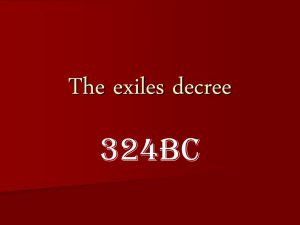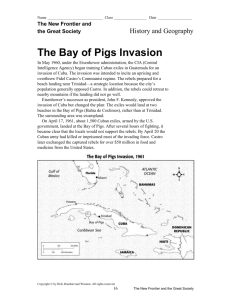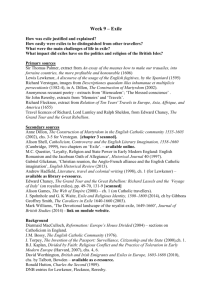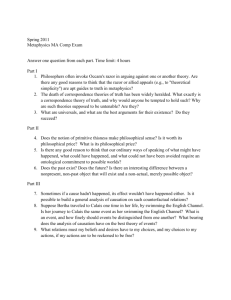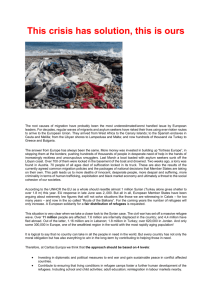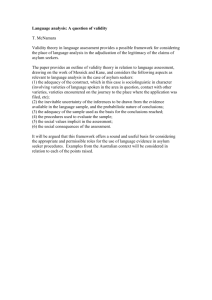The Law of the Jungles summary report 09 08
advertisement
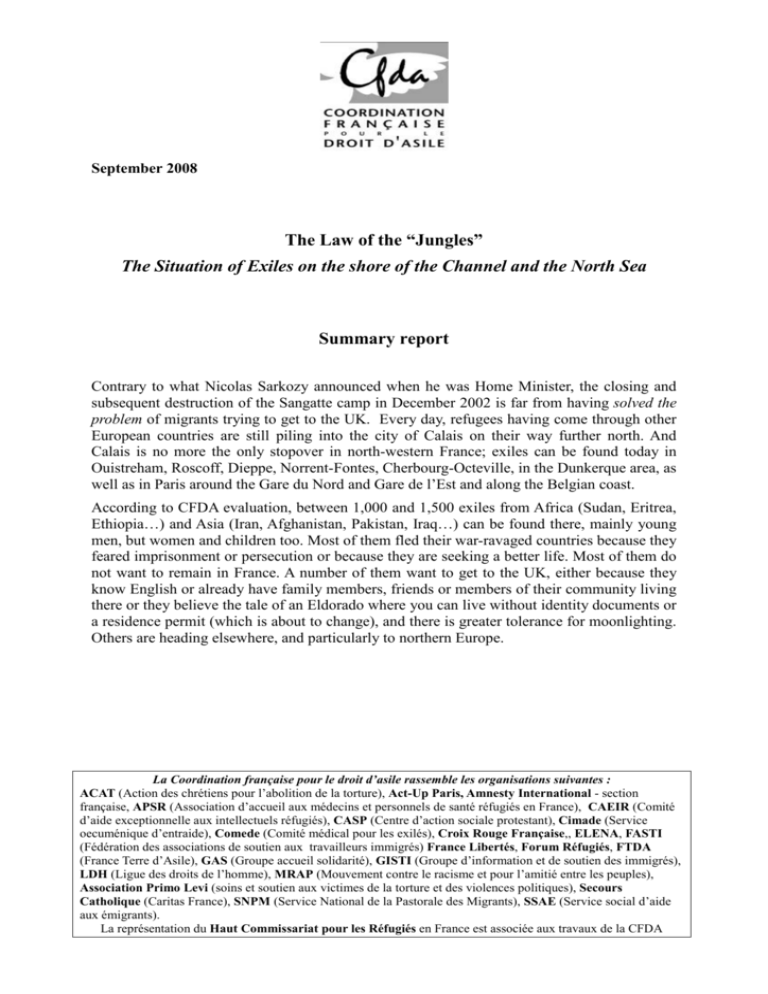
September 2008 The Law of the “Jungles” The Situation of Exiles on the shore of the Channel and the North Sea Summary report Contrary to what Nicolas Sarkozy announced when he was Home Minister, the closing and subsequent destruction of the Sangatte camp in December 2002 is far from having solved the problem of migrants trying to get to the UK. Every day, refugees having come through other European countries are still piling into the city of Calais on their way further north. And Calais is no more the only stopover in north-western France; exiles can be found today in Ouistreham, Roscoff, Dieppe, Norrent-Fontes, Cherbourg-Octeville, in the Dunkerque area, as well as in Paris around the Gare du Nord and Gare de l’Est and along the Belgian coast. According to CFDA evaluation, between 1,000 and 1,500 exiles from Africa (Sudan, Eritrea, Ethiopia…) and Asia (Iran, Afghanistan, Pakistan, Iraq…) can be found there, mainly young men, but women and children too. Most of them fled their war-ravaged countries because they feared imprisonment or persecution or because they are seeking a better life. Most of them do not want to remain in France. A number of them want to get to the UK, either because they know English or already have family members, friends or members of their community living there or they believe the tale of an Eldorado where you can live without identity documents or a residence permit (which is about to change), and there is greater tolerance for moonlighting. Others are heading elsewhere, and particularly to northern Europe. La Coordination française pour le droit d’asile rassemble les organisations suivantes : ACAT (Action des chrétiens pour l’abolition de la torture), Act-Up Paris, Amnesty International - section française, APSR (Association d’accueil aux médecins et personnels de santé réfugiés en France), CAEIR (Comité d’aide exceptionnelle aux intellectuels réfugiés), CASP (Centre d’action sociale protestant), Cimade (Service oecuménique d’entraide), Comede (Comité médical pour les exilés), Croix Rouge Française,, ELENA, FASTI (Fédération des associations de soutien aux travailleurs immigrés) France Libertés, Forum Réfugiés, FTDA (France Terre d’Asile), GAS (Groupe accueil solidarité), GISTI (Groupe d’information et de soutien des immigrés), LDH (Ligue des droits de l’homme), MRAP (Mouvement contre le racisme et pour l’amitié entre les peuples), Association Primo Levi (soins et soutien aux victimes de la torture et des violences politiques), Secours Catholique (Caritas France), SNPM (Service National de la Pastorale des Migrants), SSAE (Service social d’aide aux émigrants). La représentation du Haut Commissariat pour les Réfugiés en France est associée aux travaux de la CFDA “Invisible” from Cherbourg to Zeebrugge via Paris From Cherbourg to Dunkerque or even Paris (where they are treated somewhat better), hundreds of exiles are left to live rough, even in the deep of winter, or hardly tolerated in empty buildings; dozens of minors are left to their own devices; many sick people do not receive the same healthcare as other residents. Healthcare is in fact accessible only to those living in Calais thanks to the presence of a Permanence d’accès aux soins de santé (PASS, public medical service). While Calais is a case that requests to be dealt with specifically, other cities can be categorized in three types : a. Caen / Ouistreham, Roscoff, Saint-Malo and, on the Belgian coast, Ostende and Zeebrugge where exiles temporarily settle down; in these towns there is no specific support organization. b. In Dieppe and Norrent-Fontes there is an organization specifically concerned with the situation of exiles which came up during consultations with the idea of a “numerus clausus”. c. Cherbourg-Octeville, the Dunkerque region (with Loon-Plage and Grande-Synthe) and, in Paris, the area around the Gare du Nord and Gare de l’Est where organizations are trying to draw attention to the situation of exiles or, as and when necessary, to police violence. To various degrees, these organizations are trying to get exile/asylum issues on the political agenda All the towns on the Channel and North Sea coasts which share a link with the UK have some common features. 1) The Touquet Treaty applies to all of them. It provides for pooling French and British checks in every port with cross-Channel links and more particularly allows the British authorities to refuse entry into the UK to any foreigner who does not have the requisite travel documents even before s/he boards a boat. At present, British police operate in the Calais and Dunkerque ports and negociations are under way for Cherbourg’s. Other agreements provide for similar arrangements for eurostar’s terminal railway stations, such as the Gare du Nord in Paris and the Gare du Midi in Brussels. The shifting of British border checks into the Schengen area often goes hand in hand with their subcontracting to private companies. 2) The tightening of migrations controls along the coast and the local policies have largely emptied the places of transit, thus scattering a large number of exiles along the coast and the neighbouring areas. In the cities, exiles are “requested” to stick to a limited area, often located in the vicinity of public administrations. That way, scattered and tolerated, provided they are not seen, they are made “invisible”. 3) As there are some “indesirable” exiles whom law enforcement authorities cannot send back to their country of origin, local police from the various cities adopt deterrent measures aimed at those already on their territory, for instance regular crackdowns in camps or recalling that helping people who do not have legal residence is an offence. In Paris some exiles have been fined for “unauthorized camping”, while in several coastal cities the authorities threaten exiles who have received several deportation orders with criminal penalties. 4) Whether in Roscoff, Cherbourg, Caen, Dieppe, Dunkerque or Ostende, exiles tend to face the same difficulties: lack of information about filing an asylum application and accessing the procedure; gaining access to asylum-seekers accommodation centres (CADA) or normal accommodation centres even in winter. 2 Calais : the emblematic city The majority of exiles in transit arrive in Calais and its environs despite the harsh living conditions. The difficulties faced elsewhere are aggravated there to the point of caricature. Incredible resources to monitor, stop and expulse exiles The authorities deploy incredible resources to monitor, stop and expulse exiles from the Calais region : - The security systems set up, such as in Calais’ port, to stop people from getting onto lorries, cost some 12 million euros a year. The regular patrols, sophisticated technology, and constant reinforcement of fences have not prevented illegal crossings but do lead to about 30 people being intercepted a day. - In Calais, 530 policemen are dedicated exclusively to fighting illegal immigration while the number of exiles in town varies from 200 to 600. Exiles are stopped and questioned when they try to get up to the UK, go into town or during the regular inspections of their living quarters. According to witness accounts, the PAF (Air & Border Police) staff seem to show “enough respect”, but the CRS (Republican security Corps) give rise to more problems. They are fierce in their clampdowns on exiles and their camps, staging early-morning raids using tear gas, and destroy or burn down shelters and destroy personal property. - Exile are served prefectoral deportation orders (APRF, arrêté préfectoral de reconduite à la frontière) although most of them may not be deported legally because of their origin. And at the end, such orders are usully not carried out. Those who are expulsed after a stay in administrative detention (in the Coquelles centre) are usually readmitted by another European country. Some of them, much more rarely, have been sentenced to prison. - While the authorities are not keen on informing exiles about their legal rights (e.g. asylum applications, emergency accommodation, healthcare, protection of minors), they go to great lengths to foster “voluntary returns” to the countries of origin. At the heart of this system, the Agence nationale d’accueil des étrangers et des migrations (ANAEM, National Agency for Foreigners and Migrants) working with the International Organisation for Migrations (IOM), grants easier access to return allowances. Fundamental rights are violated In the Calais area, the central-government and local authorities are reluctant to grant social services although under French legislation they are of universal access, i.e. even those without a residence permit are entitled to them. Exiles do not have any real access to the emergency accommodation they are theoretically entitled to. The system to care for unaccompanied minors is saturated and inadequate, and information on asylum and how to apply is lacking and potential applicants are put off in a number of ways. 3 Humanitarian aid in the stead of legal provisions Deprived of everything, exiles can rely only on charitable organizations which thereby step into the gap left by the central-government and local authorities. There are a good number of them operating in the Calais area, but with scanty means. Grappling with emergencies and over-extended resources and exhaustion, NGOs find it difficult to do more than provide dayto-day humanitarian assistance (e.g. meals and showers) and make some commonly shared demands on the political front. All the organizations are short on public support at both the local or national levels. The new mayor of Calais, just like his predecessor, believes that exiles are a national problem to be solved at national level. But the successive governments since 2002 have considered the problem to be solved with the closing of the Sangatte camp and refuse to acknowledge the problem. Moreover, the pressures and court sentences are a reminder to those who go on helping exiles that they can get into trouble or be fined or sentenced to jail, and that the line between the crime of “not-assisting a person in danger” and the one of “help for illegal stay” can blur readily when such solidarity goes against government policy. Why so few asylum seekers? The exiles in camps along the Channel and North Sea coasts are mainly Afghans, Eritreans, Iraqis, Iranians, Sudanese and Somalis. Their nationality leaves little doubt as to the legitimacy of the causes of their exile: civil wars, dictatorships, massacres. Whether or not they have already applied for asylum elsewhere, most of them have very good reasons to seek protection and refuge. Given the fate of their fellow citizens applying for asylum, many of those who have not applied for asylum could probably be recognised as refugees or entitled to subsidiary protection. So why are there so few asylum-seekers in France? Because - those concerned do not have the procedural information; - reception and living conditions are a deterrent; - The asylum procedure itself is deterrent. In Calais for instance, asylum applications have to be filed in Arras, almost 100 km from Calais! Worse than that, except in the case of minors, the ‘Dublin’ Regulation deters number of exiles to apply for asylum. It restricts the review of asylum applications to a single European country, not one chosen by the applicant but the one where s/he was first tracked and had his or her fingerprints entered into the Eurodac data base. For those coming come from Central Asia, Africa or the Middle East, this is usually a country on the fringes of the European Union, where procedures are least predictable and living conditions harshest. The fear that the Arras Prefecture, when processing their asylum application, might detect their transit through this other country and send them back there often deters them from applying. 4
